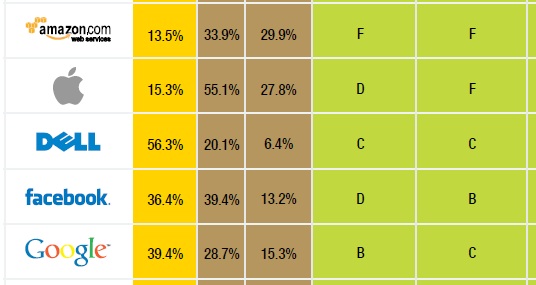Tough week for Apple on the green front. It ran into a buzz saw of ridicule for its decision to withdraw from the EPEAT product registry (a move reversed on Friday), and now Greenpeace is saying the company’s ballyhooed ultra-green North Carolina data center amounts to “mostly talk and not enough walk.”
Greenpeace on Thursday did boost Apple’s “How Green Is Your Cloud?” score, moving it to 22.6 percent from the 15.3 percent the company received in April. That puts Apple well ahead of Amazon (13.5 percent) but a long way behind Dell (56.3 percent), Google (39.4 percent) and Facebook (36.4 percent), among others.

Apple was upgraded from Ds to Cs in the “Renewables and Advocacy” and “Energy Efficiency and Greenhouse Gas Mitigation” categories, and Greenpeace’s assessment of what proportion of coal energy Apple will use to “power its cloud” fell from 55.1 to 33.5 percent, and its nuclear energy reliance similarly tumbled, from 27.8 to 11.6 percent.
Still, Greenpeace seemed put off at what it perceived to be premature hosannas for Apple based on its 100 percent-renewable data center announcement.
“Apple got a lot of kudos and positive attention for its clean energy commitments in May, but it now must explain to its customers how it plans to fully eliminate its dirty energy sources, and should extend that policy to new data centres as its iCloud expands,” Greenpeace International Senior IT Analyst Gary Cook said in a statement.
At the heart of Greenpeace’s critique of Apple [PDF]: the company’s claim that more than 60 percent of the power that its Maiden, N.C., data center will use will be generated onsite from renewable sources. Greenpeace cast a skeptical eye on several counts.
First, Greenpeace wondered about the biogas Apple said it would use to power 24 fuel cells, capable of generating nearly 5 megawatts of power.
As is common practice, because biogas can be challenging to produce at specific locations, Apple will use what is known as “directed biogas” – that is, the fuel cells will run on natural gas, but Apple will pay to have biogas in the same volume added to the natural gas pipeline elsewhere. “That pipeline could even be across the country, but Apple will still be able to claim that their fuel cells are being renewably powered,” Greenpeace wrote, and it urged Apple to find an in-state source of biogas.
Greenpeace also nicked Apple for being unclear – and possibly disingenuous – about whether it would actually use the onsite energy it produced, and about what it would do with renewable energy credits it would receive for its renewables production.
Greenpeace noted that eBay, with a Utah data center, said it will use fuel cells as a primary energy source and turn to grid power only for backup. Meanwhile, Greenpeace wrote, “Apple may in fact be selling all of the electricity it generates from its solar panels and fuel cells back to Duke (Energy),” the local utility, at a premium over low industrial electricity rates.
Greenpeace also wondered if Apple was selling those renewable energy credits to Duke while taking public credit for its renewable energy production. That would amount to double counting. “If Apple wants to be able to claim full credit for its onsite renewable power, it should follow the example of Google and others by retiring the RECs, to prevent the renewable energy from being counted twice,” the group said.

In addition, Greenpeace had questions about the other 40 percent of the energy that will power the Apple data center even after all the renewables come online. Greenpeace suggested that Apple might not be doing enough to change Duke Energy’s generation profile because it — Apple — wasn’t being specific about the local renewables it was promising to purchase and, also, was apparently going to rely to some extent on the purchase of renewable energy credits.
This is a hard-line but not uncommon critique of the effectiveness of RECs: “If Apple was to rely primarily on REC purchases, it means that no less coal is burned by Duke Energy in North Carolina … and no more renewable energy is produced to power its cloud,” Greenpeace wrote. “RECs do not send a strong, long-term investment signal to energy providers that encourage them to bring more clean energy on the grid.”
An email to Apple seeking comment on Greenpeace’s critique was not immediately answered.